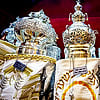Fundamental Jewish Beliefs
What do Jews believe in? The Rambam—a great Jewish rabbi and philosopher—summarized the Jewish faith in 13 principles. He starts each of those principles of faith with the words “Ani Maamin- I believe”. The following is a summary of those principles.
a) I believe in G‑d. G‑d is one. He was, is and will be.
b) I believe that G‑d is everywhere. He does not have a body. He creates everything and can see everything.
c) I believe that G‑d speaks to man. These men and women are called prophets. The greatest of all prophets was Moses. It was to Moses that G‑d gave the Torah.
d) I believe that the Torah is true. I also believe that G‑d will reward those who keep the Torah.
e) I believe that I was created to serve G‑d as explained in the Torah.
f) I believe that one day, a Jewish King called Moshiach will come and gather all the Jews to live in Eretz Yisrael. He will rule, and in his days there will be peace in the whole world. In his days, I believe that G‑d will bring the dead back to life.
Read all the Rambam's 13 principles.
In this article:
- G‑d
- Proof of the Existence of G‑d
- Divine Providence
- Accountability
- The Purpose of Creation
- The Torah
- The 613 Commandments — Mitzvot
- The Written Law & The Oral Law
- The Ten Commandments
- Mount Sinai and Belief in G‑d
- Love and Fear of G‑d
- Reward for Mitzvot— The World to Come
- Moshiach
- The Seven Noahide Laws
G‑d
What is G‑d? G‑d is a super being that creates the world. The world as we see it is made of elements that when combined make gases liquids and solids. The basic building block of all elements is the atom. Each atom is made of sub-atomic particles. Science teaches us that mass and energy are related. The energy that can bring into being the tiniest mass — we call Divine creative energy. G‑d is the source of that energy and He pumps that energy every single second into making each and every atom. In fact if G‑d were to withdraw that source of energy then the creation would disappear!
So when we are looking at a piece of wood and a piece of plastic — the reason they look and feel different is because the molecular structure in both is different — however the energy source that creates their atomic particles, something from nothing, is the same. In this sense we can understand how G‑d is everywhere, because He is the Creator of all existence. This is what the Bible means when it states that “there is nothing besides Him”.
This is also the meaning of the words "Hear O Israel, the L‑rd our G‑d, the L‑rd is one." This is not only saying that there is one G‑d (in contrast to those who believe in many gods), but in addition it means that G‑d the Creator is one single united Being that creates all. He is Omnipresent (at all times present), Omnipotent (all powerful) and Omniscient (knows all).
Read: What is G‑d?
Proof of the Existence of G‑d
There are three proofs of the existence of G‑d:
1. The stand at Sinai — this shall be discussed soon.
2. The proof by Intelligent Design — which means that when we observe the immense brilliance and complexity of the creation we must conclude that this did not come about by itself but it must have had a Master Designer and Creator. To illustrate with a story: There was once a King who asked a rabbi to prove to him that G‑d existed. The rabbi asked the King to step out of the room, and the rabbi sat at the King’s desk and took the royal quill dipped it into the ink well and wrote a magnificent poem. When he had finished, the rabbi called the King back into the room. The King read the poem and praised the rabbi for his extraordinary writing skills. The rabbi said, “I didn’t write the poem — I simply poured out the ink from the ink well onto the paper and the poem formed by itself!” “Impossible” said the King, “if you poured the ink from the ink well it is hardly likely to have even formed one letter never mind a word, or sentence and certainly not a poem that rhymes.” “So there is your proof” said the rabbi, “a poem needs a poet and the world needs a Creator.”
3. The fulfillment of Torah prophecies — when we take a look at the prophecies mentioned in the Torah we see that they have come true during the course of history. This proves that the prophecy came from G‑d who guides the course of history.
Divine Providence
Everything that happens in the world is with Divine Providence. Even if the wind turns a leaf in the street, it is with Divine Providence, meaning that it is part of the Divine plan. The explanation is because at that very moment G‑d is creating the leaf, and the wind. Although it seems to us like a force of nature, in truth it is the hand of G‑d.
Read: What Is Hashgachah?
Accountability

The rabbis teach us that we are always to be aware of three things; an eye watching, an ear listening and a hand writing. This means that everything we think, say and do is recorded by G‑d and we are held accountable for it. When we die our soul stands before a Heavenly court and has to give an account for all we have done.
The Purpose of Creation
Why did G‑d create the world? The reason G‑d created this physical world is so that we can make a dwelling for His presence in this world. Just as a person feels at home in his own home so too is G‑d to feel at home in His creation. We create this dwelling by keeping the Torah and Mitzvot.
The Torah

The word “Torah” means “teaching”. It is G‑d’s teaching to man. In the Hebrew year 2448, G‑d came down on Mount Sinai and gave this “teaching” to the entire Jewish people, through Moses, G‑d’s faithful servant. All Jewish beliefs come from the Torah. In general terms, we refer to the Five Books of Moses as “The Torah”. The Five Books of Moses can also be referred to as the Chumash.
The Torah is our very life and existence. It is Divine wisdom and is a code how to live a good and moral life. Its ways are pleasant and it leads to peace. Throughout history, Jews have studied and cherished the Torah and lived their lives according to its teachings. Through the study of Torah and fulfillment of Mitzvot we fulfill the purpose of creation which is to make a dwelling for G‑d in this world.
Read: What Is Torah?
The 613 Commandments — Mitzvot
In the Torah there are 613 commandments.
248 are Positive Commandments [do’s].
365 are Negative Commandments [don’ts].
In addition to the word mitzvah meaning a commandment, it also means a connection. This means that a Jew has 613 ways to connect with G‑d. In every aspect of life a Jew connects with G‑d through the Mitzvot. So for example we connect to G‑d in our eating by keeping the laws of Kashrut.
Read: The 613 Commandments
The Written Law & The Oral Law
When G‑d came down on Mount Sinai to give the Torah, He gave it in two parts:
1) The Written Law — Torah Shebichtav
The Ten Commandments were written on two tablets of stone and later Moses wrote down the whole written law in a scroll which we call a Sefer Torah [as we have today in the ark in the synagogue].
2) The Oral Law — Torah Shebaal Peh
G‑d explained all the 613 Commandments to Moses orally. For example, it says in the written Torah that it is a mitzvah to have a mezuzah on the door. However, it does not explain what a mezuzah is. G‑d gave the explanation to Moses and it is part of the Oral Law.
We believe that both the Written and Oral Laws are true.
Read: What Is the Oral Torah?
The Ten Commandments
As stated above, there are 613 commandments in the Torah. All of them are important. However, when G‑d came down on Mount Sinai to give the Torah, He actually spoke to the entire Jewish nation and gave them ten of these 613 commandments. The Ten Commandments are:
1) I am the L‑rd your G‑d. Believe in G‑d.
2) You should have no other gods or idols.
3) Do not mention G‑d’s name in vain.
4) Keep the Shabbat.
5) Honor your father and mother.
6) Do not murder.
7) Do not commit adultery.
8) Do not steal [kidnap].
9) Do not witness falsely.
10) Do not covet [be jealous of] your friend’s possessions.
[It is very interesting to note that in the Hebrew text, the total number of letters in the Ten Commandments is 620, to hint that all the commandments (613 plus seven Rabbinical commandments) are included in the Ten Commandments.]
Read: The 10 Commandments.
Mount Sinai and Belief in G‑d
The very fact that G‑d came and spoke to the entire Jewish people at Mount Sinai is the greatest proof of the existence of G‑d. Never in human experience has G‑d spoken to approximately three million people [600,000 men, plus women and children] as He spoke to the Jews at Mount Sinai.
If you are ever asked the question: “How do you know that there is a G‑d?” The answer is: “my parents told me that all the Jews stood at Sinai and heard the Ten Commandments from G‑d, and this fact my parents heard from their parents, and so on, going back all the generations right until the generation that stood at Sinai.”
Once a year at the Passover Seder all Jews celebrate and recall the Exodus from Egypt and the stand at Sinai. Thus it stands as an undisputed historical fact. Witnesses are the most legal and scientific proof of any fact and, as mentioned, the Revelation at Sinai was witnessed by the entire Jewish people.
Read: Who Are the Jews?
Love and Fear of G‑d
The love of G‑d motivates us to do all His 248 positive commandments [do’s].
Love of G‑d is called Ahavat Hashem. The fear of G‑d keeps us from transgressing any of the 365 negative commandments [don’ts]. Fear of G‑d is called Yirat Hashem, (and is often referred to as Yirat Shamayim).
G‑d is our Father and our King. We must love Him as a Father and fear Him as a King.
G‑d’s name is so holy, we do not read it as it is written. The name YHVH we read Adonai. In conversation, we call G‑d Hashem — meaning “The Name”, referring to the Holy Name of G‑d.
Read: Fear or Love?
Reward for Mitzvot— The World to Come

For every good deed a person does he will be rewarded, and for every bad deed a person does he will be punished. The true reward for mitzvot is not in this world, but in the World to Come. The World to Come is the world to which our souls go after we die. It is there that the soul is truly rewarded. It is often called Gan Eden — The Garden of Eden.
Many people ask: “Why do we see good people suffer and bad people prosper?” One of the answers is that G‑d may be punishing the good people for their small amount of bad deeds in this world only to give them a huge reward for all their good deeds in the World to Come. The opposite is true of bad people. In the end, justice is done.
Moshiach
The word Moshiach means “anointed”. In the olden days before a king assumed office, he was anointed with oil. So too, there will come a time in the future when a Jew who is both learned and a descendent of King David will be anointed as a king and will rebuild the Temple in Jerusalem and gather all the Jews to Israel. This King is called Moshiach.
In the days of Moshiach, there will be no wars or famine and everybody will have all they want. The Jews will be able to sit and study Torah in peace and the whole world will be full of the knowledge of G‑d. The generation we are living in is the generation just before the coming of Moshiach and we eagerly await his coming every day. We also do lots of mitzvot to speed up the coming of Moshiach.
The Seven Noahide Laws
Not only does the Torah contain teachings for the Jew, but it also has teachings for the non-Jew. These are called the Seven Noahide Laws — seven universal laws given by G‑d to Noah and subsequent generations. The Seven Noahide Laws are:
1) Believe in G‑d. Do not serve idols.
2) Do not blaspheme.
3) Do not steal.
4) Do not kill.
5) Do not commit adultery.
6) Keep the laws of the land.
7) Do not eat a limb from a live animal or be cruel to animals.
The Rabbis explain that the seven laws are only general guidelines, but in truth non-Jews are required to pray, give charity, honor parents etc. It is the responsibility of a Jew to influence the non-Jewish world to keep the Seven Noachide Laws.














Join the Discussion